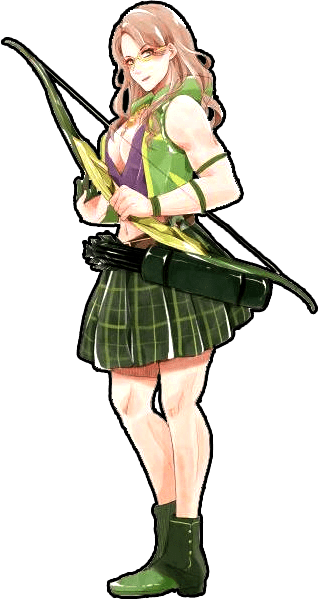
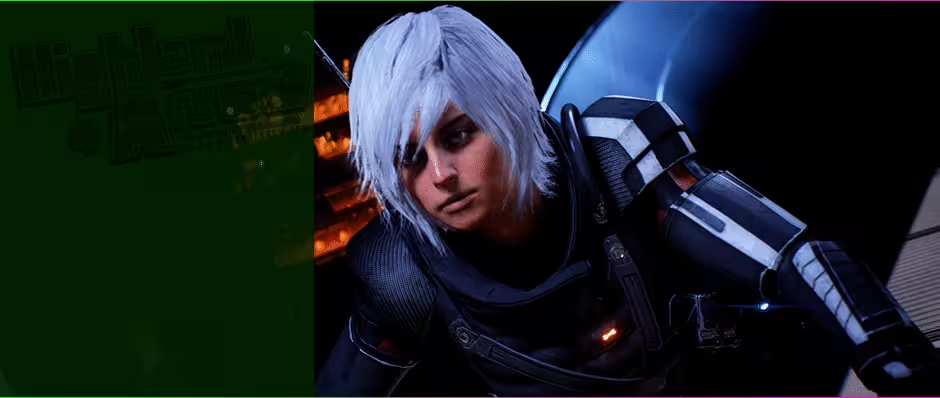

Mass Effect: Andromeda
Single-Player Review
Platforms: PC, PS4, XONE
Reviewed on: PC
Reviewer: Maiyannah Bishop
Review Play-Time: 272h
Developer: Bioware Montreal
Publisher: Electronic Arts
Released: 2017-03-21
Review Published: 2017-05-29
Review Updated: 2020-06-06
+ Mobility changes to combat mechanics make combat
much more awesome
+ High graphical fidelity
+ Interesting sandbox universe to explore
+ Decent if formulaic story that is well-told
- Melee combat is very clunky
- Select animations and textures are very mediocre
- A lot of the story feels cut out to meet the deadline
- Multiplayer cross-over content rather weak
- Character writing is inconsistent and erratic
- Secondary presentation makes the game feel padded

Mass Effect: Andromeda is the latest in the hybrid third-person shooter/role-playing game series developed by Bioware and published by Electronic Arts. I went into this review wanting to review this game, because the polar split in coverage didn't honestly feel like either side was being fair to the game, and ultimately I pen this review to digital paper with some mild trepidation, because I doubt either side is going to be terrible happy with my analysis of the game. Ultimately, Andromeda is a game that ran out of something - be it time, or manpower, or Twinkies around the water cooler, or whatever. There are some parts of this game that show an incredible amount of care, and attention to detail - and others that look like they were banged up in a single minute in Adobe Photoshop. It is a very uneven production that can be quite jarring at times - but ultimately, if you can look past the flaws, Andromeda is a game that delivers on the core game-play. For some people, that it does this will be more than enough, while others will be put off by the pretty poor production values overall. There's both heights here: things so great that I wish the game did more of it, and things so terrible they almost put me off entirely, but while it's easy to be just as polar as the people I criticised a scant few sentences ago, the heart of the matter is most of it is simply mediocre - neither great nor terribly bad. That fact is both Andromeda's saving grace, and ultimately, what I suspect will be it's killing blow, at least in terms of commercial success. Let's break this down a bit, shall we?
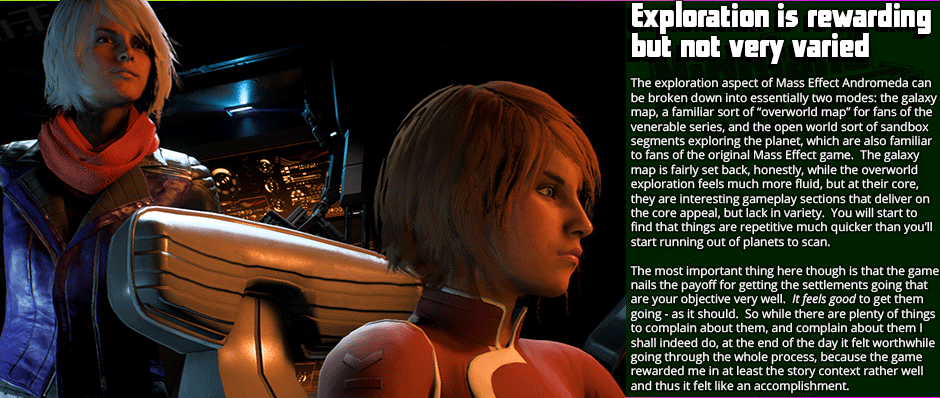
The galaxy map is a familiar backdrop for fans of the series as mentioned, but there are a variety of changes and tweaks to it which, overall, I think make it less rewarding and feel like more of a chore. It functions by presenting a series of systems you can explore, you select one, then select a planet from that system to scan. Unlike Mass Effect 2 you do not have to scan over the entire surface of most planets, you select a planet, hit scan, and ... unless there's something there, you are done. Progress through the system is counted with a completion percentage at the top of the display, and that's pretty much that. The way the game mixes up what would otherwise be a very sterile experience outside of finding the few worlds that you can land and explore in a detailed fashion, is the introduction of the "anomalies". This has two specific implementations that come down to two different layers: there can be an anomaly in a system, or an anomaly on a planet. The latter is how you found many of the hidden hubs in Mass Effect 1, and indeed how you got a window into the Cerberus activities if you chose to follow up on them, but in Andromeda they are much less interesting: simply deposits of minerals, or geological phenomenon, and the like. They give you either resources or experience, and this is where the game falls down a little bit - the resources are valuable if a bit more time consuming than most people will probably enjoy spending their time procuring, but the experience bonuses, especially if you have gear or the cryo perk (we'll talk about those later) that grants additional experience for encounters, the amount of experience you get from these finds is easily outstripped by a single combat encounter of any difficulty, and many of the random encounters, even. However, since the game doesn't telegraph at all which finds are which, they're basically dud finds, token rewards to keep the 100-percenters going. It might be appealing to them, but for myself, it felt like the game was starting to be disrespectful of my time as this went on.
Probably the most tiring aspect of the galaxy map to me was the secondary presentation. Allow me to expand: every time you do something there's a pan, or a little travel animation, or this and that, and they're not all that short. Most of the travel animations are a good thirty seconds, so it can take several minutes just to catalogue an entirely empty system with nothing for you but a couple of crisps packets and the world's tiniest experience bonus. This is where that feeling the game doesn't respect my time comes from - it's actively wasting it to pad out the game's play time, and I'm pretty sure even when I was an insecure teenager in middle school trying to come off as having bigger tits than I actually did even I wasn't using quite this much padding. A friend of mine added it up and the game wastes literally a couple hours of your life on this travel animation, and it's not even hiding loading screens or the like in the galaxy map, so it basically serves no purpose other than to waste your time. Ultimately this just serves to end up highlighting how few of the planets actually have something of interest on them, or even something masquerading as being of interest, because it takes that time both to get there and get somewhere else when you've realised that world has nothing for you.
Some time into me playing the game (like more than 60% through according to the completion percentage) a patch was introduced which the optimist in me hoped would ease how much of the secondary presentation feels time-wasting, but it was a half-hearted attempt - the galaxy leaps were unskippable still and the planet-to-planet ones you had to wait a good few seconds into it before the prompt to skip it comes up, which might alleviate some of the time that gets wasted, certainly, but feeling grateful for something like that seems like feeling grateful that someone torturing me was ditching the thumbscrews and only going to proceed with hot irons from that time forward. It's a "fix" for a problem that only existed because the game didn't respect my time to begin with.
For those unfamiliar with the dual mode setup utilised by the game: the galaxy map is basically a sort of hub "over-world" where you select individual locations to go to from, in the context of Andromeda this is planets. However, while "planets" leaves one with the impression that the planets themselves could constitute over-world hubs, they mostly don't. The various planets you come across run the gamut from large to aggressively-small, but none of them are so large they break up into hubs - or needed to anyways, as there's a few where the game does this. This is done mostly to control game flow, however, not because of any extra-ordinary size on the part of the planets. Nonetheless, only a couple of them felt too small, and ended up feeling restrictive, and one of those two at least had an explanation for being thus which made sense.
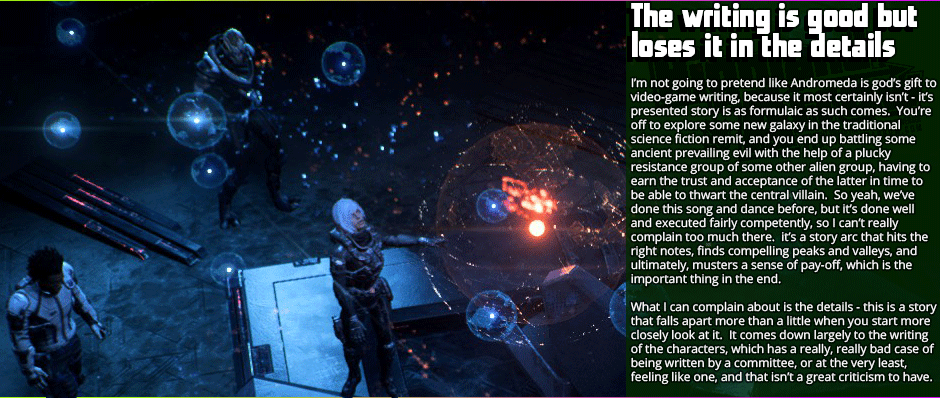
Characters can vary in personality greatly between, for instance, the more or less curated special companion scenes on the ship, and the things they say out in the field. Let's use Liam as an example, since he is one of the first companions you receive so me name-dropping him can't be considered too terrible spoiler-y. In those crafted sequences you are presented with a character that's kind of the likeable side of the whole dudebro thing - he's a security guard, he likes sports, he drags a sofa onto the seat to put his feet up, and he's generally painted as a guy whose laid back and not terribly serious about things, but competent and able when the chips are down. Meanwhile in the missions outside of the ship, and his general banter, he comes off as a mildly-racist negative nancy always stressing out about this or that. Now, it's not completely out of left field that a character can change when the stresses of combat and the actual realities of deep-space exploration set in, but it never comes off as trying to accomplish that kind of character, and in any case, if it pulled that off, I wouldn't be explaining this whole thing if I felt that it was done well and pulled it off. The overall impression I got was that the companion-specific stuff were written by one person and the general dialogue by another, or some others.
When I first went into this review I was somewhat expecting to tear the character writing a new arsehole but the more I think about it, the actual character-specific stuff is pretty interesting and well-done in a kind of safe, mainstream sort of way anyways. The disconnect that is presented is more in the specific sections and the generalist ones, as I mention - it is almost as if you had two different teams, one writing "plot" and the other writing "character dialogue" and they were kept from cooperating upon penalty of death or something similar, because the gap between the two is never really met. It's a bridge never crossed, a stream never forded. Resulting from this is a general feeling of the overall plot being disconnected from the ultimately quite petty concerns of the individual characters, and often they feel at cross-purposes. A lot of conflict in the plot exists merely for the sake of conflict and seems quite artifical.
That said, it's not a huge friction point and didn't ruin the experience for me. It was more, strange, an oddity or curiosity, that made the experience more just "strange" than straight-out "bad" or "good". And honestly as I consider those words, I keep coming down to the phrase "its good but...". I would call Andromeda very much a flawed gem ... one flawed in the make anyways that a lapadiarist got halfway done through cutting and then got told to drop it.
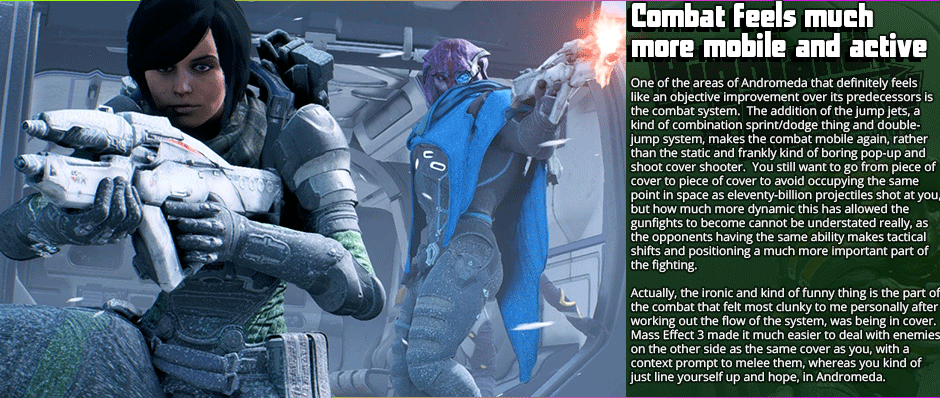
Melee in general felt very clunky on the keyboard with analog controls. There didn't seem like any compensation for being slightly off in "aiming" it and a lot of melee attacks would whiff because you weren't centre of mass on target, basically, even if you did hit some part of them. While its a shooter so I guess that's more than forgivable, it's odd, considering the game they're lifting the engine from is Inquisition, which did both melee and ranged combat very fine. It's somewhat better on a game-pad and obviously designed for one giving that it "feels" much more better on an analog thumb-stick than on the keyboard, but it still feels less than ideal. At the end of the day though, its not the focus of the combat, that's the abilities and the shooting, and being highly mobile while you chain together powers and gunning makes the experience a true "run and gun" kind of shooter, while still maintaining an element of difficulty since you're not going to take too many hits so you still want to be intelligent about moving through areas utilising cover.
Ultimately though, combat is just the connective tissue between activities, and while the story is mostly okay with its flaws as I've already gone over, the other activities came off just as busy work - busy work that since the patches upped item limits and similar stuff you'd previously be unlocking, seems ultimately kind of pointless. There's very much a grind aspect to doing all the Remnant vaults and sites, hitting a bunch of rocks, and all the other associated faff. A good RPG keeps this done through the lens of focusing on the overarching goal, such as Strife's side questing all making sense as in aid of doing your objective of overcoming the defenses around the Order's compound, for example, but Mass Effect struggles with. If you're the kind of person that gets absorbed in sandboxes you're probably easily going to get side-tracked and lose sight of your actual aim. There's something to be said for freedom but striking the balance between freedom and maintaining a coherent narrative is perhaps one of the most difficult tasks in RPG game design, and unfortunately, I can't say I feel that it pulls it off very well.
As to the relevance of the side questing, on both the "normal" and "hard" difficulties I ended up calling it and going to the end game at about 2/3 total completion and I absolutely steamrolled the final boss with no difficulty at all, so that does somewhat hang a question mark at best over it. That I end up asking how much it helps me defeat the end boss to do all this stuff also highlights that the game didn't do a very good job of making me feel invested in the variety of subplots that are around. The companion-specific stuff really is the high point of the narrative in that regards.
One big problem with the free-form approach is the game is lying to you about it being free-form. Before you go to write me an angry letter for calling the developers dishonest, let me expand on what I mean when I say this, so when you're pissed off at me, you can at least be pissed off at me for the right reasons. There's a certain order in which you usually have to do the missions in, despite it being obstensibly an open-world (open-galaxy?) game. This leads to a lot of situations where I was confused as to how to advance a given mission or plot point, because I had gotten as far as the game was allowing me to get without having done something else, elsewhere, earlier. The game is very poor about signposting this in many instances, and the game only excerbates this problem by encouraging you to explore and "do things your way." In this case due to the mediocre implementation, this has come at the cost of much of the narrative structure. The developers clearly wanted a linear story-based here, and designed one, only to begrudgingly have to allow exploration to keep the theme. It shows quite clearly in the design.
Another side effect of this is because the game is checkpointing progress and is designed in a linear way in spite of being a sandbox, the save point you can end up set back to if you do die can be literally miles away from where you were. You're definitely best served by manually quick-saving in Andromeda, which thankfully unlike examples like pre-patch Shadowrun Returns, you can at least do.
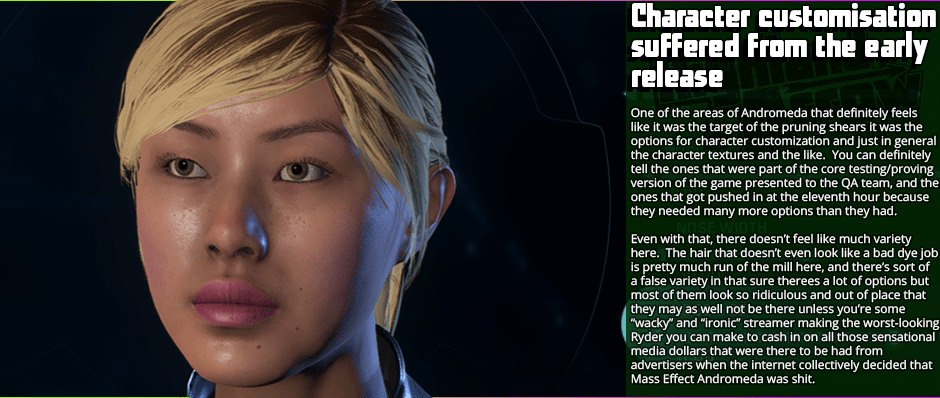
The problem I personally had with the character customization however wasn't so much the variety per se, but rather that it felt like I wasn't actually making my own character. It was more like, here's a bunch of presets for Ryder and you can kind of fiddle with them or whatever, so you can take a preset and change some sliders for minor variations, but its still going to look fundamentally like the preset, just changed a bit, instead of ever feeling like it was own character. While I can already hear the yawns of the people just here for the exploration or shooting aspect being disinterested in this, Andromeda is still obstensibly an action RPG, and the first letter in "RPG" is "roleplaying" - an important component of which is being able to feel some sort of connection or ownership of your protagonist. You don't need to make the protagonist customizable to do this - the Nameless One in the much-lauded Planescape: Torment wasn't at all customizable in appearance - this places a deeper requirement on the writing, and the writing just isn't good enough to carry the game on it's own.
Texture quality and other graphical issues are the bane of the technical aspects of the game. It's not so much the engine as what they've done with it - some of the effects and textures are quite obviously hack jobs, and the production quality is very uneven throughout. There's a curious attention to detail in some things, having the armour get gritty and dulled as you traverse through sand, or covered in snow and the sheen of ice in snow, that clashes with quite obviously bad things in some places, like the fact that the effect for the black hole on the galaxy map plays over whatever is rendered in the same circle, so planets literally light-years away still look distorted, or even worse, your UI. The animations made the headlines front and centre, but honestly, this is less a case of them being universally bad, and more of a case of them being mostly just "OK" and mostly unnoticeable in terms of quality as particularly great or abhorrent, but the ones that do stick out, are pretty damn bad. I make no apologies for those, but it's a problem that frankly, was blown out of proportion by salacious rumour-mongers that desired either attention or advertising revenue or both and the way they were presented as the norm for the game was frankly deeply disingenuous.


